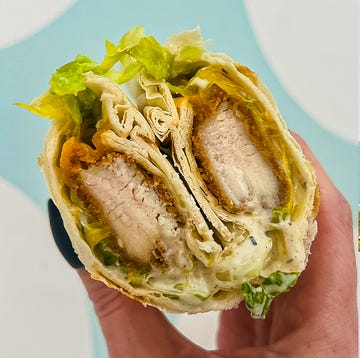The COVID-19 pandemic has continued to touch almost every facet of our lives, including how we eat. The food industry has been hugely impacted and many restaurant and bar owners are trying to find ways to keep themselves afloat. As such, some customers have been noticing something called a "COVID-19 surcharge" on their bills recently. Here's what you need to know about it.
What is a COVID-19 surcharge?
It can vary restaurant to restaurant, but it seems to be largely a small, temporary fee (usually around five percent) designed to help businesses navigate rising food prices and limited restaurant capacity during the pandemic. For example, Kiku Japanese Steakhouse in Missouri implemented such a charge and said it did so because it didn't want to impose hikes on menu prices. (It has since switched to increased menu prices, according to its Facebook page).
"Please understand we are not doing this to take advantage of you guys! We are doing this hoping we can adjust the surcharge weekly rather than just raise all of our prices on our menu due to increase prices from our supplier on meat, poultry, seafood & produce," the restaurant wrote in a Facebook post.
Restaurants in places like California, Illinois, Michigan, and Missouri have been shown via social media adding the charge.
Why is it happening?
The food supply chain, especially when it comes to things like meat and poultry, has been disrupted because of the pandemic, with processing plants closing and grocery prices skyrocketing. Restaurants say their suppliers are also seeing shortages and price increases.
“We’re just trying to pay the bills so we can stay open until this is over,” Brad White, owner of Goog’s Pub & Grub in Michigan told Fox 17. He also stated that it's not only food supply prices that are taking a toll: Generally serving take-out is more expensive than dine-in orders.
Is it legal?
Gregory Frank, a partner at Frank LLP Class Action Litigators, told The Today Show that this practice is legal, especially if the restaurant discloses it to customers beforehand.
"Generally, restaurants are allowed to structure their pricing however they like," he said. "The important question is whether the restaurants are disclosing to consumers what they are paying before they pay it, so they can make their own informed choices."
That said, the surcharge hasn't always gone over well. Brian Stack, owner of Bootleggers BBQ (also in Missouri), said that even though regular customers seemed to understand when they posted about imposing a surcharge, others began to harass employees. As such, they've taken off the surcharge and simply raised menu prices.
"I have 26 employees that we have managed to keep at the same hours or more throughout this," Staack told The Today Show: "All I was trying to do was cover our added food cost and keep them working. But people who wouldn't take the time to listen to me on the phone, or read our explanation on Facebook would rather make threats. My staff didn't deserve that at all."
How will you know if there will be a surcharge?
Many restaurants have notified customers via their social media pages if there will be a charge. Some have also put a message in their restaurant windows, but obviously, not all of us are going to the restaurant these days.
If you're concerned about a surcharge, check the restaurant's website and social media pages before placing your order. If you're calling them to place the order, you can also (nicely!) ask. Once you get your receipt, if you were to have been charged a COVID-19 surcharge, it'll be near the sales tax section.
Again, this is likely a fairly small, temporary charge designed to help restaurants stay in business and keep up with rising costs.













